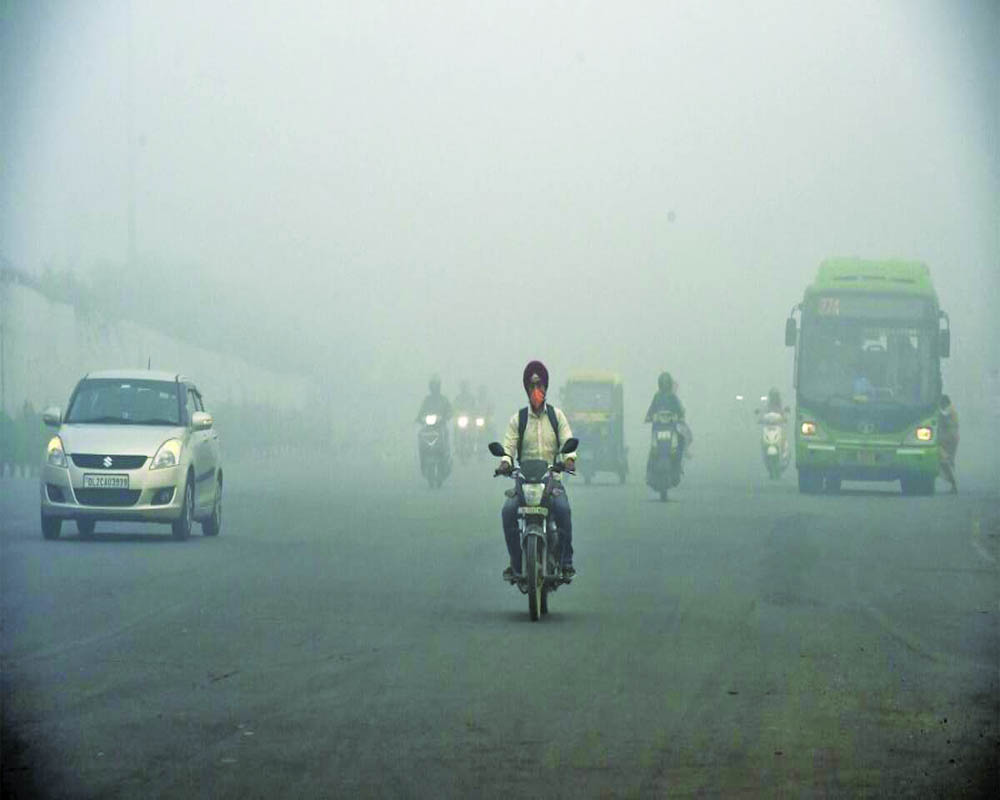Peddlers of the vehicles-pollute-Delhi narrative are silent over the most comprehensive study which blames biomass burning for the mess
If there is anything more polluted than Delhi’s air, it is the discourse on the environment. For years, we were told that vehicular emissions were the root cause of dirty air in the national capital. Now, the most authoritative study on the subject has pointed out that the real reason is something else: biomass burning. The proponents of the vehicles-pollute-Delhi narrative are conspicuous by their silence on the matter.
According to the US Energy Information Administration, “Biomass is a renewable organic material that comes from plants and animals.” It includes wood and wood processing wastes, agricultural crops and waste materials, biogenic materials in municipal solid waste, and animal manure and human sewage.
The study, led by the Indian Institute of Technology Kanpur, had contributions from 19 scholars and experts from the Physical Research Laboratory, IIT Delhi, the Central Pollution Control Board (CPCB), the Paul Scherrer Institute (PSI), Switzerland, and University of Helsinki, Finland. Researcher Suneeti Mishra and Prof Sachchida Nand Tripathi, both from the Department of Civil Engineering, IIT Kanpur, co-authored the paper.
In the study, published in the prestigious Nature Geoscience journal, the scholars “observed intense and frequent nocturnal particle growth events during haze development in Delhi from measurements of aerosols and gases during January-February at the Indian Institute of Technology in Delhi... We estimate that this process is responsible for 70 per cent of the total particle-number concentration during haze.”
It went on to say “that the condensation of primary organic vapours from biomass burning is the leading cause of the observed growth.” It further said, “As uncontrolled biomass burning for residential heating and cooking is rife in the Indo-Gangetic plain, we expect this growth mechanism to be a source of ultrafine particles, affecting the health of 5 per cent of the world’s population and impacting the regional climate.”
In other words, the health of almost 40 crore people is adversely affected by biomass burning.
Switzerland-based IQAir’s recent World Air Quality Report confirmed this. It ranked Delhi and Rajasthan’s Bhiwadi fourth on the list of 50 most polluted cities in the world in 2022. In addition, six Indian cities figure in the top 10 most polluted cities, 14 in the top 20, 39 in the top 50, and 65 in the top 100. In 2021, there were 61 in the top 100.
No one disputes that the quality of air is extremely poor in not just the national capital but also in entire northern India. It is a diagnosis that is not just wrong but also dangerously misleading. In addition, there has been a persistent effort on the part of doctrinaire environmentalists to distract attention from the real cause.
It is not that a non-vehicular source of pollution was never suspected or detected. In July 2021, for instance, a study by IIT Kanpur’s Tripathi found that in summer, 52 per cent of Delhi’s PM 2.5 concentration was because of dust.
Yet, the entire debate about the cause of air pollution revolved around vehicles, especially cars. This was the reason that the Delhi Government under Arvind Kejriwal opted for the odd-even scheme to curb it.
Nothing could be further from the truth. According to the latest National Family Health Survey-5, just about 8 per cent of Indian households own cars. In Delhi, one in five households owns a car. In comparison, in Helsinki, the third cleanest city in the world, there are more than two cars for every individual. In general, Western nations have more cars per household than in India, and yet the air there is much cleaner than in our country.
At the heart of the problem of air pollution in India is not automobile density (which is low anyway) but illegal urbanisation; slums and unauthorised localities are destroying our cities. The consequences are rampant encroachments, unregulated and dangerous construction, solid waste dumping, contamination and death of water bodies, drying of aquifers, and countless more. Unsurprisingly, many areas become dust bowls—and are shrouded in a haze caused by biomass burning.
Addressing these issues presupposes a fundamental change in governance and politics. This certainly involves actions that would be disliked by the beneficiaries of chaotic urbanisation: the residents, the local authorities, the local politicians, the bleeding-heart activists, even certain sections of the media. Anybody determined to clean up the mess runs the risk of being branded as ‘anti-poor,’ heartless, etc.
It begins with a win-win situation. The original landowners get much higher prices than they would have got had they sold it as farmland; those with meager resources get a house of their own; the officials concerned get bribes; local politicians provide protection from legal action and get votes in return; and all manner of employers get a cheap workforce.
Few are interested in the real analysis of the situation, for that would mean challenging the dogmas of received wisdom.
The flourishing tribe of activists is certainly not interested in anything that hurts their shibboleths. Besides, it is easier to blame everything on those who are better off, like car owners. So, fake analysis continues, with horrifying consequences, as underlined by the IQAir report.
(The writer is Resident Editor, The Pioneer, New Delhi. The views expressed are personal)


























